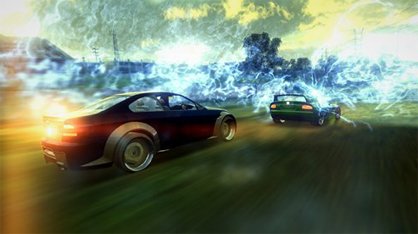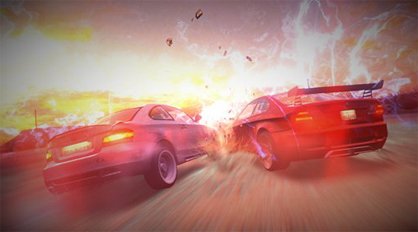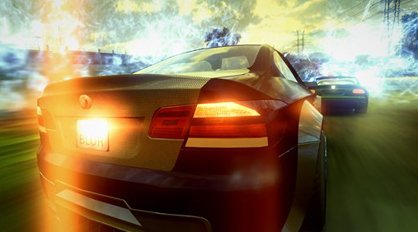Blur
Hands-on with the 'PGR for everyone' combat racer
"When we were developing this idea of power-ups or special abilities at first we started off in our own little cage and we thought 'an extra turbo… or extra brakes' and we started putting in more stuff that affected the car's performance… you couldn't notice it. It didn't make a blind bit of difference which of these abilities you had.
"Then someone said, 'why don't we just have an electric shockwave?' And we were like 'you can't do that! What are we thinking!" And it took us three or four months to break out of that 'this is what racing games do' mindset. You're not allowed to have fun in racing games, it's not allowed!"

"In PGR we were so constrained by reality. So as soon we made that mental 'yeah, let's do stuff that's actually fun' it just opened the floodgates and we started really enjoying it," adds Chudley.
Blur's "perks" currently consist of Shock, Shunt, Barge, Nitro, Mines and Repair and take the form of simple, distinctive neon icons floating on the track. Players begin with just a single slot to store their power-ups but eventually the number will grow to five, allowing you to switch them around – and potentially create combos.
Most of the perks you'll be able to work out from their names; Mines drops a glowing yellow payload onto the road, Nitro gives you a boost and Barge shoots other racers up the rear like a crackling, electric green shell.
Our favourite though is Shunt; a burst of electrical energy that shoots from both sides of your vehicle and sends opponents skidding into the roadside. Sparking visual flair combined with a new, impressive car damage system means it looks powerful and feels satisfying.
"We're approaching the idea of power-ups differently than what other games do," explains community man Ward. "For example in Mario Kart or Wipeout they just have the power-ups decide the course of the race; you can fire a big ass blue shell, blow up the people in front and then you win the race.
Sign up to the GamesRadar+ Newsletter
Weekly digests, tales from the communities you love, and more
"That's not really what we're about, we're more about augmenting your racing talents with the power-ups so it's more strategy to the race. If you're not good at driving you're probably not going to win the race."
And from our hands on he's not lying. Blur's perks definitely require skill and timing to use effectively. Fire an engine-disabling Shock on a straight for example and targeted cars will simply carry on rolling forward anyway.

Shunt and Barge are also totally dynamic, which means if you skilfully target a rival on the rear in the middle of a turn he'll spin-out wildly into the scenery - which is also where drift-heavy muscle cars come in handy.
As Ward says, you don't feel totally cheated by power-ups; every time a competitor locks a rocket or energy-fuelled shove onto your motor, you're given the chance to skill counter with a quick on-screen flashing X-button, which is a crucial addition. If you're totally annihilated, your car quickly respawns on the track.
By far the most interesting piece of Blur's makeup though is the social network, at this stage cleverly called 'Blurb' (other suggestions included 'MyRace' and 'Racebook – but the lawyers turned up for those).
When you turn on Blur you're asked to create a profile. From there you can make friends, post photos and messages, customise your motors and even create Facebook-style "groups" to shape the style of racing game you want to play. This is how Blur will work – both online with real people or offline with the AI.
The inspiration, apparently, is from the large amount of the players who made up their own game modes in PGR 3 and 4, including "cat and mouse" – a scenario which had players teaming up in super cars and minis – the former pushing the latter towards the finish line.

"PGR 3 and 4 players made the game better and we had absolutely nothing to do with it. We'd just exposed the game to the community," explains Chudley. "The person that made that first cat and mouse game... we want him to have some recognition."
When creating an online group in Blur players will be able to define a wide set of rule sets, from the way points are scored (coming first, taking out another racer - even the number of yards you're ahead of the car behind), a group 'badge', environments and cars used… or you can just turn off the power-ups and play straight PGR-style.
"We're saying the hardcore are less than 1% of our audience, but we anticipate there'll be a lot of hardcore groups; no perks, all speed," says Mr. Bizarre.
The potential is, at concept stage at least, massive. One group explained to us had wrecked players come back as "zombie" cars to harass the remaining racers. Another, the rather daft-sounding "David Hasselhoff" demanded in its rules that players shout "I love the Hoff!" whenever they overtook.
With this mock social network Bizarre hopes to bring a human element to the racing genre, and yes – put some of the fun back in as well.
"Blur is like big boy bumper cars," concludes community man Ward. "When you get in there everyone's aggressively trying to win but afterwards when you get out people don't hate each other... it's like 'that was really fun! Let's go again!' People aren't arseholes about it; they just want to have fun. That's the mood we want to achieve with this game."


